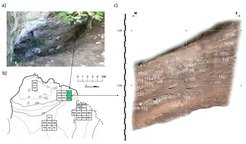Mesolithic Humans Ate More Shellfish Than We Thought
New study conducted in northern Iberia reveals that molluscs contributed significantly more to the diet of Mesolithic peoples living in Atlantic Europe than previously hypothesized

Langre Beach and intertidal areas in Cantabria (Northern Spain) where the collection programme was conducted.
.During the Mesolithic period in Spain, as in other regions of Atlantic Europe, humans increasingly turned to the coasts for sources of food and left behind mounds of discarded mollusc shells, termed ‘shell middens’ by archaeologists. Previous studies have used shell middens to examine the relationship between foraging strategies and climate change, but the role of shellfish in the diets of the last hunter-fisher-gatherers is still little understood.

"Phorcus lineatus" at El Mazo beach in Cantabria (Spain).
The current study, published in Quaternary International and led by archaeologists from the Max Planck Institute for the Science of Human History and the University of Cantabria, reconstructs the meat yield of the four main mollusc species recovered at the El Mazo cave shell midden in northern Spain. They find that mollusc meat contributed at least 20 Percent of the meat obtained from hoofed mammals, revealing a much larger role in Mesolithic diets than previously suggested.
To accurately estimate mollusc meat yields, archaeologists Asier García-Escárzaga and Igor Gutiérrez-Zugasti collected modern specimens of the four most prevalent species found at El Mazo. Shell collections were carried out at Langre Beach in Cantabria, Spain every 40-50 days over a three-year period. After collection, the meat from the molluscs was measured using two different methods, depending on the morphology of each species and whether the meat needed to be cooked before being extracted. The resulting dataset enabled accurate the team to estimate the meat yield from the shell remains recovered in the shell midden deposits of El Mazo, and compare them with meat yields from mammalian remains recovered at the same site.

El Mazo: a) View of the rockshelter of El Mazo; b) topographic map of the rockshelter showing excavation areas and provenance of the studied samples (shaded squares) and c) stratigraphy of the inner test pit
The results of the study highlight that mollusc meat contributed at least 20 Percent of the meat yield obtained from hoofed mammals, a value notably higher than in previous studies.
"The role of shellfish is one of the key unknowns in relation to subsistence strategies and human behavior during the Mesolithic along the Atlantic façade of Europe," says García-Escárzaga, "but our results have shown that molluscs had a greater dietary importance than previous studies have proposed."


